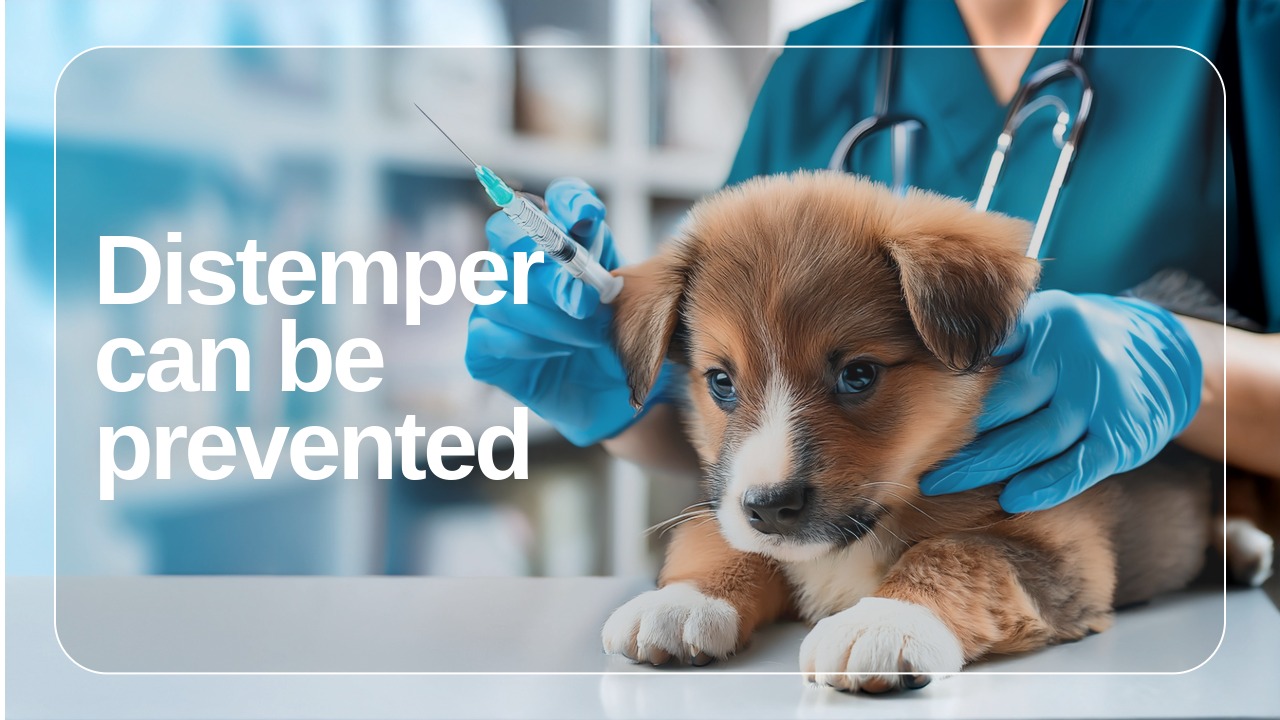published on: 13.06.2025

Distemper in Dogs
Canine distemper is a serious and highly contagious viral disease that can affect dogs of all ages, but puppies and unvaccinated adults are at the highest risk. Caused by a virus similar to the one that causes measles in humans, it attacks a dog's respiratory, gastrointestinal, and nervous systems. While the disease can be devastating, the good news is that it is highly preventable through a reliable vaccination schedule. Understanding the signs, how it spreads, and the importance of prevention is the first step in keeping your dog safe.
Key Takeaways
- What It Is: Canine distemper is a contagious virus that attacks a dog's respiratory, digestive, and nervous systems.
- How It Spreads: The virus spreads through the air (coughing/sneezing), direct contact with infected animals, and contaminated objects like bowls and toys.
- Key Symptoms: Early signs include thick eye/nose discharge, fever, and coughing. It can progress to seizures and permanent nerve damage.
- Treatment: There is no cure for distemper. Treatment involves supportive care to help the dog's immune system fight the virus.
- Prevention is Crucial: The distemper vaccine is extremely effective and a core part of routine puppy and adult dog care.
What Is Canine Distemper and How Does It Spread?
Canine distemper is caused by a paramyxovirus, a type of virus related to human measles. When a dog is infected, the virus attacks cells throughout the body, including in the breathing tract, stomach, eyes, and brain. Because it is a systemic disease, its effects can be widespread and severe. Young dogs with immature immune systems and unvaccinated adult dogs face the greatest danger from this illness.
The virus is highly contagious and spreads easily. An infected dog sheds the virus in its bodily secretions, like breath, saliva, and eye discharge. According to the American Veterinary Medical Association (AVMA), the primary mode of transmission is through airborne exposure from an infected animal's sneeze or cough. The virus can also live on surfaces like food bowls, toys, and bedding for several hours, making shared items a source of infection. It's also important to remember that wildlife, including raccoons, skunks, and foxes, can carry and pass the virus to domestic dogs.
Symptoms: From Early Signs to Serious Dangers
Distemper symptoms can progress from mild to life-threatening, so recognizing them early is critical. In the initial stages, you might mistake the signs for a less severe illness like kennel cough. However, as the virus spreads through the body, the symptoms become much more severe and can lead to permanent damage or death.
| Symptom | Canine Distemper | Kennel Cough |
|---|---|---|
| Cough | Wet, persistent cough | Loud, "honking" cough |
| Discharge | Thick, yellow/green from eyes & nose | Usually clear, watery discharge (if any) |
| Other Signs | Fever, lethargy, vomiting, diarrhea, seizures | Generally bright and alert, sneezing |
Many dogs that survive the initial illness are left with lasting neurological problems. It's crucial to monitor your dog for the following signs.
Early Warning Signs to Watch For:
- Thick, yellow or green discharge from the eyes and nose
- A fever that may come and go
- A persistent cough and runny nose
- Lethargy (lack of energy) and poor appetite
Later-Stage Complications:
- Severe vomiting and diarrhea, which quickly lead to dehydration.
- Pneumonia, causing difficulty breathing and potentially blue-tinged gums.
- Thickening and hardening of the skin on the nose and foot pads (called "hard pad disease").
- Neurological signs like muscle twitching, head tilting, circling, or seizures as the virus attacks the brain.
Treatment and Prevention: Your Best Defense
There is currently no drug that can kill the distemper virus, so treatment focuses on helping the dog's body while its immune system fights the infection. This is done through **supportive care**, which means managing the dog's symptoms and supporting their body's functions rather than curing the disease itself. This care is intensive and often requires hospitalization. Supportive care often requires hospitalization, IV fluids, and medication, which can become very expensive. This financial burden is another strong reason why preventative vaccination is so important.
Because treatment is difficult and often unsuccessful, prevention is the key. The canine distemper vaccine is highly effective and considered a core vaccine for all dogs. A typical puppy vaccination series starts at six to eight weeks of age, with boosters every three to four weeks until they are at least 16 weeks old. Adult dogs need a booster one year after their puppy series, and then typically every three years after that. Until a puppy is fully vaccinated, you should keep them away from high-risk areas like dog parks and puppy classes where they might encounter unvaccinated dogs.
When to See a Veterinarian
If your dog, especially if unvaccinated or young, shows any signs like eye discharge, coughing, or lethargy, it's crucial to seek veterinary care immediately. Early diagnosis and intervention provide the best chance for a positive outcome. For a complete check-up, vaccination, or any health concerns, schedule a visit with us at ZaraVet, your vet in Tbilisi.
FAQ: Canine Distemper
Q: Is canine distemper contagious to humans or cats?
A: No. The canine distemper virus does not infect humans. Cats can get feline distemper (panleukopenia), but it is a completely different virus and not related to canine distemper.
Q: How effective is the distemper vaccine?
A: The vaccine is very effective. When administered correctly as a series in puppies and kept up-to-date in adults, it provides excellent protection against the disease.
Q: What should I use to clean surfaces to kill the virus?
A: The distemper virus is relatively easy to kill outside the body. Most standard disinfectants, including diluted bleach solutions (1 part bleach to 30 parts water), are effective. Be sure to check the label to ensure it is rated for killing the paramyxovirus.
References
Come over for a visit at 77 Sulkhan Tsintsadze St, Tbilisi
Or call Us +995 599 996 487
